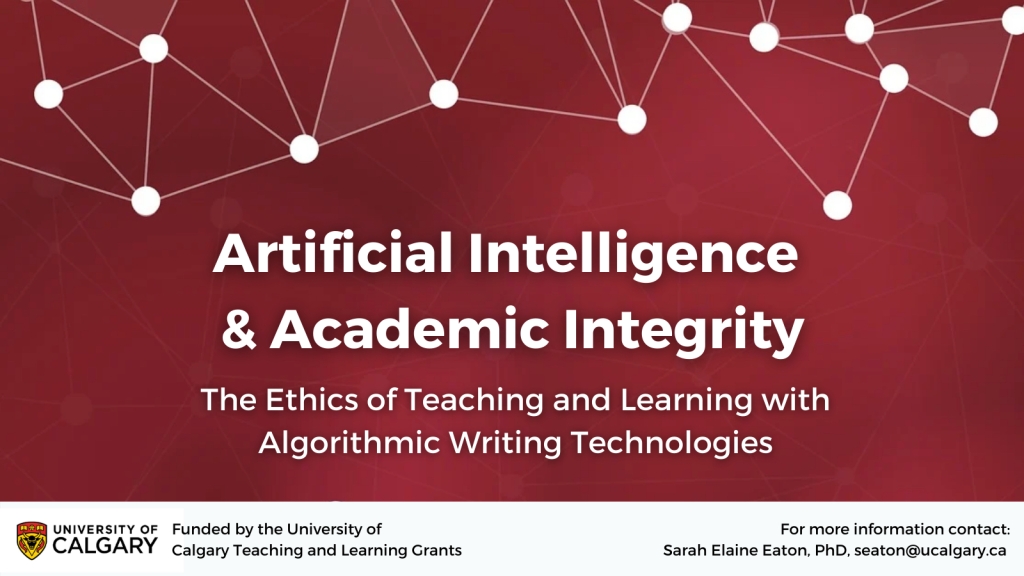Book Editor: Alysia Wright (University of Calgary, Canada)
Contact: Please send any related inquiries to aihigheredbook@ucalgary.ca
Update: Deadline for proposals extended to July 15, 2022
The nature of online learning is changing rapidly, necessitating agility and creativity among educators who strive to ensure academic integrity in their courses and programs. While the principles of academic integrity remain the same across modalities, the way that these principles are enacted vary according to delivery modes, learning technologies, disciplinary pedagogies and standards, and institutional contexts.
This call is intended to identify chapters for an edited book that will elucidate diverse perspectives and ways of promoting academic integrity in post-secondary online learning courses and programs. This book offers both scholarly and pedagogical examinations and discussions of transformative approaches to academic integrity in online learning, and submissions are welcomed from higher education professionals, practitioners, and scholars. We welcome a variety of contributions from case studies to preferred practices, historical inquiries, empirical studies, literature reviews, and conceptual papers. Chapters will include substantive references to credible sources.
Potential Topics:
Pedagogy and Course Design: Chapters on this topic explore course design strategies, frameworks, and pedagogies that improve academic integrity and reduce academic misconduct in online courses and programs.
Ethical and Moral Problems: Chapters on this topic address the moral and ethical problems of academic integrity in online learning, presenting novel solutions or considerations to ameliorate these problems in online courses and programs.
Use of Learning Technologies: Chapters on this topic investigate the selection, adoption, and use of learning technologies to promote academic integrity in online learning, such as the use of proctoring software and plagiarism-checking tools.
Community-building: Chapters on this topic focus the use of community-building, networking, and shared inquiry to promote academic integrity in online learning.
Academic Integrity Literacy: Chapters on this topic discuss approaches or strategies for increasing students’ understanding of academic integrity in online learning environments in diverse institutional contexts, including departmental and disciplinary norms and expectations.
Deadline to submit a proposal: If you are interested in submitting a book chapter, send a 500-word proposal by July 15, 2022. Submit your proposal via this form for review.
Chapter proposals should clearly indicate:
- Proposed title (Maximum 12 words, including sub-title, if applicable)
- Purpose statement
- Methodology or submission type (i.e., empirical research, historical inquiry, literature review, etc.)
- Overview of topic(s) to be addressed
- Originality and significance of the work
- Reference list (APA 7th edition) (Minimum of 3 references)
- Full contributor information (name, institution, e-mail, social media handles, ORCid, alternative contact information) and brief bio (~50 words)
- Names and contact information for up to 3 potential reviewers for peer-review Proposals will be reviewed for suitability using the following criteria:
- Substance and quality of the proposal, including the proposed source material (i.e., references)
- English language proficiency
- Clarity and feasibility
- Alignment with the proposed chapter topics
Note that chapters with excessive self-citations will not be favourably received. Decisions on chapter proposals will be made by September 1, 2022 (or before) and sent to the primary contributor as indicated on the proposal submission form. Accepted chapter proposals will be used to develop the full book proposal and contributors will be notified about deadlines for full chapter submissions upon acceptance of the book proposal. Full chapters are to be 5000-8000 words, including abstract, keywords, and references (APA, 7th ed.). Chapter drafts will undergo rigorous peer review. Deadline for full chapters will be mid-2023, with an exact deadline to be confirmed once the book proposal has been approved by the publisher.
About the book editor
Alysia Wright, PhD Candidate, is an Educational Development Consultant at the University of Calgary, Canada, where she also teaches at the Faculty of Social Work as a sessional instructor. She brings more than a decade of community and educational development experience to her teaching and consultation practice. Alysia is currently the academic lead for a three-year initiative to catalyze blended and online learning at the University of Calgary, which has included the development and delivery of faculty development initiatives with a focus on pedagogy, academic integrity, and intentional use of learning technologies to promote student-centered learning.
_________________________________
Share or Tweet this: CFP: Transformative Approaches to Academic Integrity in Online Learning: Perspectives in Higher Education – https://drsaraheaton.wordpress.com/2022/04/22/cfp-transformative-approaches-to-academic-integrity-in-online-learning-perspectives-in-higher-education/
This blog has had over 3 million views thanks to readers like you. If you enjoyed this post, please “like” it or share it on social media. Thanks!
Sarah Elaine Eaton, PhD, is a faculty member in the Werklund School of Education, and the Educational Leader in Residence, Academic Integrity, University of Calgary, Canada. Opinions are my own and do not represent those of the University of Calgary.



 Posted by Sarah Elaine Eaton, Ph.D.
Posted by Sarah Elaine Eaton, Ph.D. 



You must be logged in to post a comment.